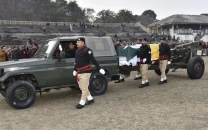Anti-Money Laundering Act: Govt to review limit for punishing tax evaders
Lawmakers have opposed move to declare tax evasion as an offence

PHOTO: FILE
In a bid to persuade legislators to withdraw their opposition, the government on Wednesday hinted at reviewing the Rs10 million limit that it proposed for treating tax evasion as an offence under Anti-Money Laundering Act.
The government showed this flexibility during a meeting of Senate Standing Committee on Finance and Revenue that had been called to discuss the Anti-Money Laundering Amendment Bill along with other issues.
The standing committee also discussed the issue of the commercial banks’ reluctance to give loans or open bank accounts of Politically Exposed Persons (PEPs) that include politicians, judges, military personnel and other public office holders.
Deputy Governor State Bank of Pakistan, Saeed Ahmed, admitted that banks were creating hurdles for the PEPs, saying the central bank would call a meeting of the presidents of the banks to resolve the issue.
AML Act
Parliamentarians belonging to both sides of the political aisle reiterated their opposition to government’s move to declare tax evasion as a predicate offence, which if substantiated, can land the offender in jail for up to 10 years. In addition to the prison term, offenders are also slapped with Rs1 million in fines.
Senator Saleem Mandviwalla, the chairman of the standing committee, refused to put the Bill for voting until the government withdraws the tax evasion related amendments.
Shahid Asad, Senior Member Inland Revenue of the Federal Board of Revenue, offered that the government was ready to relax the Rs10 million condition. Under the proposal, if a person evades the tax to the tune of Rs10 million, he will be prosecuted under the Anti-Money Laundering (AML).
Mandviwalla feared that the FBR would misuse these powers and defame politicians and even the taxpayers.
Under a condition of International Monetary Fund, the government has proposed amendments in the AML Act of 2010, the Income Tax Ordinance of 2001, the Customs Act of 1969 and the Federal Excise Act of 2005.
These amendments will allow the use of anti-money laundering tools to combat tax evasion and abuse of the investment incentive scheme to launder criminal proceeds. In order to find a solution, a meeting will now be held at the central bank.
PEPs
Lawmakers also came hard on the central bank for meting out discriminatory treatment to politicians. Mandviwalla said because of the SBP’s decision to notify PEPs requirements, the politicians and their relatives were facing serious problems in opening bank accounts and getting loans.
The deputy governor SBP said that the PEPs also include heads of the state and government, bureaucrats, judges, military officials and senior executives of the state-owned corporations.
“I have also suffered because of PEPs requirements. My name is similar to that of head of Jamaat-ud-Dawa and the bank took 21 days to transfer $10,000 from one bank to another”, said Saeed Ahmed, deputy governor of the central bank.
Published in The Express Tribune, August 20th, 2015.



















COMMENTS
Comments are moderated and generally will be posted if they are on-topic and not abusive.
For more information, please see our Comments FAQ